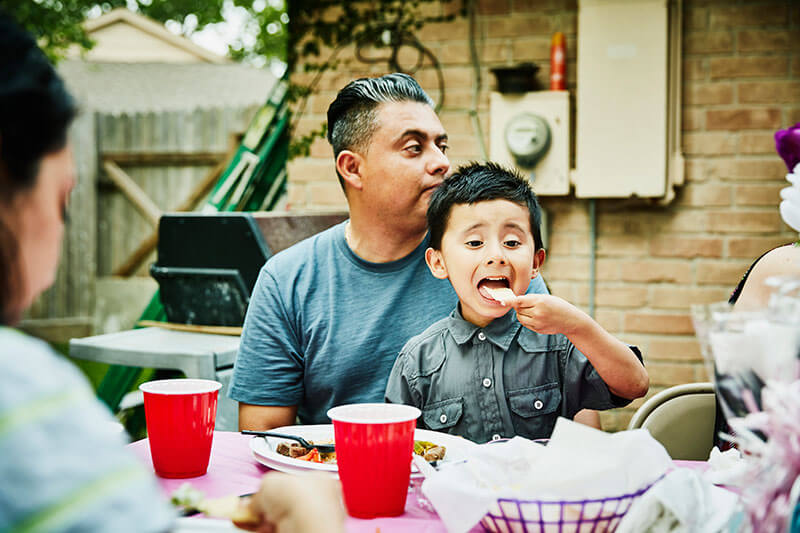How Long Does Dcfs Let You Keep Your Foster Status With a Family of Children
Resource Family Responsibilities

All foster parents and relative caregivers must complete the Resources Family unit Approving (RFA) process. Once this procedure is completed, you are approved by Los Angeles County to care for children in demand of a temporary or permanent family.
Resources Family Approval Process
Afterwards you consummate the RFA process, a kid may be placed in your home within a matter of days, weeks, or months. In some instances, a child may be placed with you prior to existence canonical as a resources family. Learn more about Emergency Placements.
There are many things y'all will need to be enlightened of to offer a stable and supportive environment for the kid. You will as well take access to many resources to aid support you as y'all undertake this rewarding task.
Some things to consider:
Visitation

Over the form of a child's case with DCFS, their parents have the correct to visit and see their kid while they are working to resolve their instance unless otherwise ordered by the courtroom. In many situations, the courtroom may determine where and when parents and children are able to visit with one some other.
The kid in your care must exist able to brand these visits with their parents. Scheduling can be complicated, but it is important to work with the county social worker to ensure that parents have admission to their children every bit much as is permitted.
Courtroom Proceedings

When a child enters foster care, their case is overseen past the juvenile court, also known every bit the children's courtroom or dependency court. The kid volition be assigned an chaser, called the "small-scale's attorney," and a primary caseworker, besides called a social worker.
You lot will need to understand how the courtroom process works to support the kid while they are in your care. Here are some things to keep in listen:
- The child in your care must be nowadays at their initial hearing and subsequent courtroom dates. Talk to the county social worker if you need help arranging transportation or learn more most our transportation policies.
You are non required to attend courtroom hearings unless you are asked to attend by the attorney, social worker or probation officer. However, it may be useful then you lot tin stay informed about the child's case and offer emotional support for the child.
- In juvenile court, the attorney represents the child. Relatives and caregivers are not represented in the dependency court process. However, yous may share data well-nigh the child with the court and attorneys.
If you are a resources parent or relative caregiver and you wish to share information with the courtroom, you can complete the Caregiver Information Form (JV-290)/ Información del cuidador (JV-290S) and submit it straight to the courtroom, to the kid'southward attorney, or to the kid'due south social worker. If yous wish to go along your contact information confidential, complete the Confidential Information Course (JV-287).
- If yous accept concerns or question about notices to caregivers or JV-290 forms, you may email your inquiries to the inbox at pinquiries@dcfs.lacounty.gov, or call (213) 351-5602 or (213) 352-5603 during standard business hours.
Relatives may also share information with the court by completing the Relative Information Form (JV-285) / Información del pariente (JV-285S).
Foster Youth Bill of Rights

California Foster Youth Bill of Rights
The California Foster Youth Nib of Rights was written by the California Youth Connexion, a statewide organisation of youth in the foster intendance system. It outlines the personal rights and protections for individuals who are in out–of–dwelling care. As a immature person in foster care, yous have:
- The correct to be treated with respect.
- The right to adequate living weather.
- The right to acceptable voluntary medical, dental, and psychiatric care.
- The right to off-white handling in administering rewards and punishments.
- The correct to contact with family members, Canton social workers, attorneys, Court Appointed Special Advocates and other designated developed supporters.
- The correct to instruction and community involvement.
- The right to work and develop job skills.
- The right to social contacts.
- The right to adequate clothing.
- The right to a reasonable allowance.
The ten rights above cover so many areas of your everyday life. Download and print this poster for like shooting fish in a barrel reference.
California Foster Youth Bill of Rights
Los Angeles County Foster Youth Bill of Rights
Every bit the largest kid welfare system in the country, the Los Angeles County Board of Supervisors recognized that it should create its own Foster Youth Bill of Rights and Services to ensure that youth in the foster care organisation are provided every reasonable resource to facilitate their development as "healthy, educated, and self-sufficient" young adults.
The Los Angeles County Foster Youth Bill of Rights and Services is under development and is projected to be completed early in 2019. It will provide necessary data about services, programs, and legislative mandates to youth and resources families in Los Angeles County.
Education

Unless the courtroom determines otherwise, parents maintain rights over their child's educational decisions, even while they are living with a foster family unit or relative. As their caregiver, you play a crucial role in supporting the educational success of the youth in your care. It is important for foster parents and relative caregivers to maintain contact with the schoolhouse and the didactics rights holder if appropriate to support the youth'south educational needs.
If y'all feel a youth's education rights holder is not meeting the youth's needs, reach out to the kid's social worker.
Foster Youth Education Rights include:
- A stable schooling placement that is the least restrictive for them.
- Admission to academic resources, services, extracurricular, cultural, and enrichment activities.
- Opportunity to attend school regularly with minimal disruption.
- Enrollment at their school-of-origin following a alter in their residence if you then choose.
- Enrollment in a school with their peers.
Social workers and educational providers are required to ensure that the child in your care feels safe, comfortable, and is successful in their bookish pursuits. Foster youth accept the right to the same educational opportunities as all students, consistent with their historic period and developmental level.
Furthermore, foster youth have the correct to "immediate enrollment" should they motion schools. A new school must "immediately" enroll a foster youth even if the youth has outstanding fees, fines, textbooks, or other items due to the schoolhouse terminal attended or is unable to produce records or clothing normally required for enrollment, such as previous academic records, medical records, immunization records, proof of residency, other documentation, or school uniforms.
Transportation
Foster youth rely on their caregivers to get them safely to school. To help in this effort and the financial costs associated with transporting foster youth to school, the School Stability Transportation Pilot program was created. Under this airplane pilot program:
- y'all can send the child and receive an Teaching Travel Reimbursement;
- the child tin can be issued a bus pass or tap card, if advisable;
- A kid-friendly transportation services may be used, if advisable;
- or, the child's school commune-of-origin tin can provide transportation through existing school bus routes.
Talk to your social worker nearly making school transportation arrangements, and ask about the School Stability Transportation Pilot for more information.
Medical Care

Children with DCFS cases are automatically enrolled in Medi-Cal. As a resource parent, it is your responsibleness to make sure the child in your intendance sees their doctor for any necessary cheque-ups, vaccinations, or other required health monitoring. For information well-nigh their medical history and necessary physician visits, contact the child's social worker.
Youth Medical Intendance
Source: https://dcfs.lacounty.gov/caregivers/rights-responsibilities/
0 Response to "How Long Does Dcfs Let You Keep Your Foster Status With a Family of Children"
Post a Comment